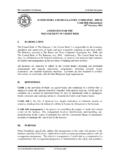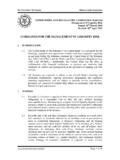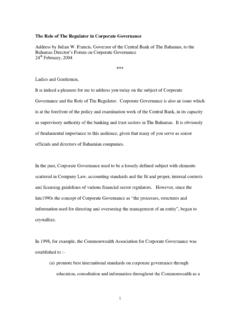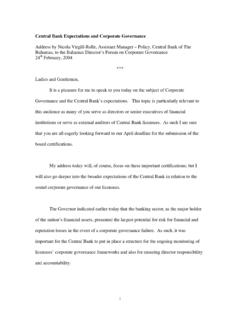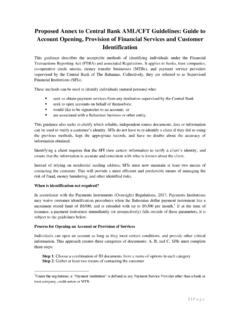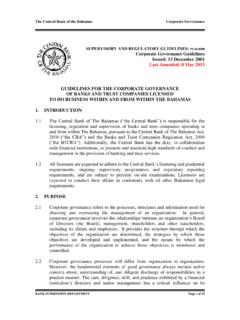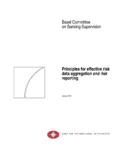Transcription of Know Your Customer Requirements
1 know your Customer Requirements for Banks and Trust Companies ** Presented by: Rochelle A. Deleveaux Legal Counsel The Central Bank of The Bahamas Box N-4868 Nassau, Bahamas Tel: 1 (242) 302-2611 Fax: 1 (242) 323-7795 Email: 22nd August 2002 1 TABLE OF CONTENTS Page 1. The Role of The Central Bank of The Bahamas 3-4 2. The basel Committee on Customer Due Diligence 4-6 3. Verification of Identity (VOI) The Statutory Regime Relevant Law 6-7 Whose Identity Should be Verified? 7 When Must Verification Occur? 7-8 Exemptions 8 Written Confirmation 9 4. What Documentation Is Required? Documentation Requirements for Specific Cases: (i) FTRA and the FTRR 9-10 (ii) Well known individuals 10 (iii) Old account information for established individuals 10-11 (iv) Source of Funds 11-12 (v) Deceased Beneficial Owners/Settlors/Asset Contributors 12 (vi) Nominee Asset Contributors 13 (vii) Declarations of Trust 13-14 (viii) Declaration of Beneficial Ownership 14 (ix) Declaration of Beneficial Ownership for Companies Managed by Financial Institutions 14 (x) Declaration of Beneficial Ownership in relation to trusts 14-15 (xi) Expired Passports and other documents 15 (xii) Certification of ID Documents 15-16 (xiii) Section 26 FTRA 16 (xiv) Character/Credit References for new Deposits/Loans 16 (xv) Confirmation of Postal and Street Addresses 17 (xvi) Documentation for the Verification of Minors 17 (xvii) Verification of Permanent Residential Address 17-18 Appendix i 2 1.
2 The Role of The Central Bank of The Bahamas The Central Bank of The Bahamas ( the Bank ) has statutory responsibility for supervising and regulating banks and trust companies in The Bahamas. The Bank s interest primarily is to ensure that banks and trust companies licensed pursuant to the Banks and Trust Companies Regulation Act, 2000 ( BTCRA ) have due regard to and implement appropriate safety and soundness policies and procedures which tend toward the preservation of the banking system in The Bahamas. Section 5 (1) (b) of the Central Bank of The Bahamas Act provides that one of the duties of the Bank is: in collaboration with the financial institutions, to promote and maintain adequate banking services and high standards of conduct and management therein. The Banks and Trust Companies Regulation Act 2000 (BTCRA) goes on to specifically address the role of the Central Bank as the Supervisory and Regulatory authority for banks and trust companies (licensees) licensed in The Bahamas.
3 In particular, the BTCRA establishes the Office of Inspector of Banks and Trust Companies and sets out the duties of the Inspector and the general criteria to be used for supervising licensees. See section 9 and 13 and Schedule 1 of the BTCRA. Two of the duties of the Inspector in connection with monitoring KYC standards and policies of licensees are: (i) to conduct on-site examinations and off-site supervision of the business of licensees for the purpose of satisfying himself that the provisions of the BTCRA or the Financial Transactions Reporting Act, 2000 are being complied with. See section 9(2)(b) BTCRA; (ii) to inspect and supervise banks and trust companies in accordance with the Rules for Inspection and Supervision set out in the First Schedule. See section 9(f) and 13 BTCRA. Section 13 of the BTCRA incorporates the approach of the basel Committee to banking supervision:- The Rules set out in the First Schedule shall be observed by the Inspector for the purpose of supervising banks and trust companies and 3 their operations so as to ensure the preservation of the soundness and efficiency of the banking system.
4 Those provisions of the First Schedule which relate to know your Customer standards also reflect the recommendations and approach of the basel Committee to banking supervision in this important area. Paragraphs 1(a) and 1(h) of the First Schedule provide as follows: The Inspector shall: (b) establish appropriate and prudent standards for conducting safe and sound banking and trust business; .. (h) ensure that banks have in place internal controls adequate to the nature and scale of their operations, and adequate policies, practices and procedures, including strict know - your - Customer rules that promote high ethical and professional standards, and so prevent the use of the bank for criminal purposes; In carrying out its functions, the Bank has regard to the recommendations of the basel Committee insofar as they have been incorporated in the statutory regime relevant to banks and trust companies.
5 2. basel Committee on Customer Due Diligence1 The basel Committee s guidance on Customer Due Diligence for Banks advocates generally, that adequate know your Customer (KYC) policies and procedures have particular relevance to the safety and soundness of banks in that they o prevent reputation risk and preserve the integrity of the banking system by preventing the use of the bank for criminal purposes. o complement the risk management strategy of banks (by enabling them to identify, limit and control risk exposure in assets and liabilities). These procedures should be treated as a critical element in the effective management of banking risks. The basel Committee approaches KYC due diligence issues from a wider prudential, not just anti-money laundering perspective. Licensees may be exposed to unnecessary risks where there are inadequate KYC policies and procedures in place. These risks include reputation, operational, legal and concentration risks.
6 1 This document may be obtained from the website of the Bank for International Settlements: 4 Reputation Risk The risk to earnings or capital arising from the potential that negative publicity regarding an organization s business or ethical practices will cause a decline in the Customer base, costly litigation or revenue reduction; such risk often arises from the mismanagement of other risks. Operational Risk The risk to earnings or capital arising from the potential that inadequate information systems, operational/transactional problems in service and product delivery, breaches in internal controls, fraud, failure to properly adjust to changes in the operating complexities of the markets, or unforseen catastrophes will result in unexpected losses. Legal Risk The risk to earnings or capital arising from the potential that unenforceable contracts, lawsuits or adverse judgments may disrupt or otherwise negatively affect the operations or financial condition of the organization adversely affect the operations or condition of a bank.
7 Concentration Risk Potential that a bank is over exposed to a single borrower or connected group of borrowers. The Basle Committee postulates that a licensee s due diligence policies and procedures should address at least four (4) essential areas: (1) Customer acceptance policy (2) Customer identification (3) on-going monitoring of high risk accounts Note: The existing statutory regime of The Bahamas requires financial institutions to monitor all accounts (4) risk management. 5 Under the basel Committee s guidance Customer includes: beneficial owners of accounts or facilities, that is, the person in whose name the account has been opened or the person on whose behalf the account is maintained.) beneficiaries of transactions conducted by professional intermediaries. any person or entity connected with a financial transaction that can pose a significant reputation or other risk to the bank.
8 3. Verification of Identity (VOI) The Statutory Regime The Central Bank of The Bahamas has regard to the overarching policy of the Banks and Trust Companies Regulation Act, 2000 and the Requirements of the Financial Transactions Reporting Act, 2000 and other relevant legislation when assessing the know your Customer (KYC) policies and procedures of licensees through its on-site examination process. Licensees need to know : - the identities of their customers - the purpose and intended nature of the business relationship - the expected activity and size of the account to enable them to monitor their relationship with their customers, understand the Customer s on-going business and if necessary provide evidence in the event of disputes, legal action, or an investigation by the Financial Intelligence Unit, or the Police. The Financial Transactions Reporting Act, 2000, ( the FTRA ) and the Financial Transactions Reporting Regulations, 20002 ( the FTRR ) require that due diligence be carried out on customers of financial institutions so that an institution knows the identity of each of its customers and has sufficient information about their customers to enable the institution to determine whether there are any unusual or suspicious activities going on in relation to a particular Customer or account or transaction.
9 Financial institutions are required to obtain documents and information which confirm a Customer s identity on an objective basis. Knowing your Customer includes being aware of the nature of the transactions which a Customer is likely to engage in throughout the business relationship. Relevant Law When establishing and implementing know your Customer (KYC) policies and procedures, financial institutions, which are licensed and regulated by the Central Bank of The Bahamas, should have regard to the following legislation and guidelines: 2 The Financial Transactions Reporting Regulations, 2000 may be found on the website of the Central Bank of The Bahamas at: 6 (1) Banks and Trust Companies Regulation Act, 2000 (2) Financial Transactions Reporting Act, 2000 (Act No 40 of 2000)3 (3) Financial Transactions Reporting Regulations 2000 (SI No 111 of 2000)4 (4) Proceeds of Crime Act, 2000 (5) Financial Intelligence Unit Act, 20005 (6) Financial Intelligence (Transactions Reporting) Regulations, 2001 (7) Financial Intelligence Unit s Anti-money Laundering Guidelines for Banks and Trust Companies Whose Identity Should be Verified?
10 Financial institutions are required by the FTRA to know who the beneficial owners of their facilities are. For the purposes of the FTRA, the identity of any person from any of the following groups must be verified or confirmed: Individuals Corporate entities whether incorporated in The Bahamas or elsewhere Partnerships Unincorporated Associations Unincorporated businesses When Must Verification Occur? The FTRA provides that Customer identity must be verified in the following 3 As amended by the Financial Transactions Reporting (Amendment) Act, 2001 (Act No 17 of 2001) 4 As amended by the Financial Transactions Reporting (Amendment) Regulations (SI No 113 of 2001) 5 As amended by the Financial Intelligence Unit (Amendment) Act, 2001 (Act No 20 of 2001) 7 cases: (a) financial institutions are required to verify the identity of each and every existing facility holder. This exercise should be completed by 31st December 2002; (b) before a new account or facility is opened; (c) where there is doubt about the identity of an existing facility holder; (d) whenever the amount of cash involved in an occasional transaction exceeds $10,000.
